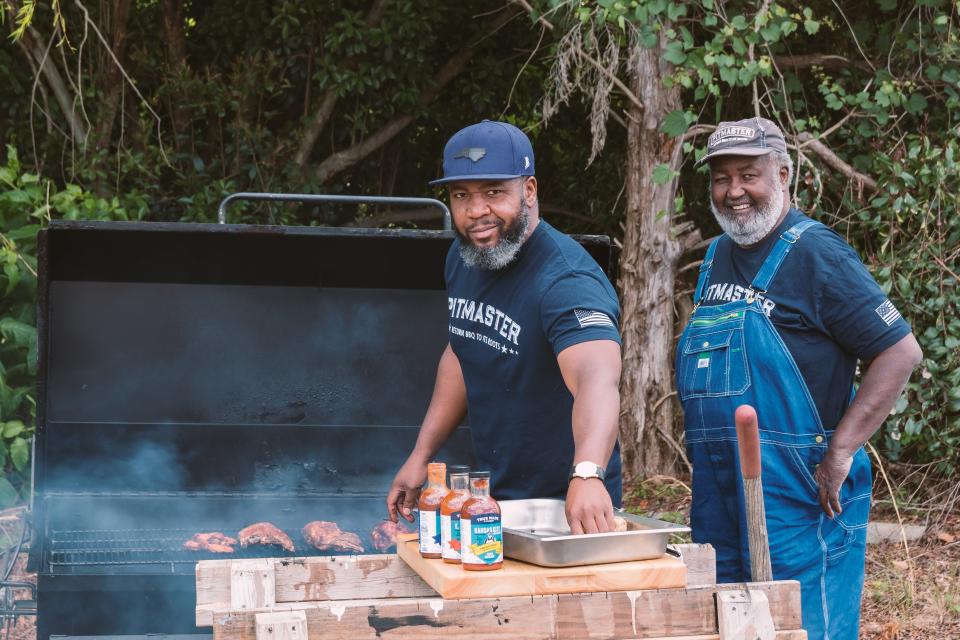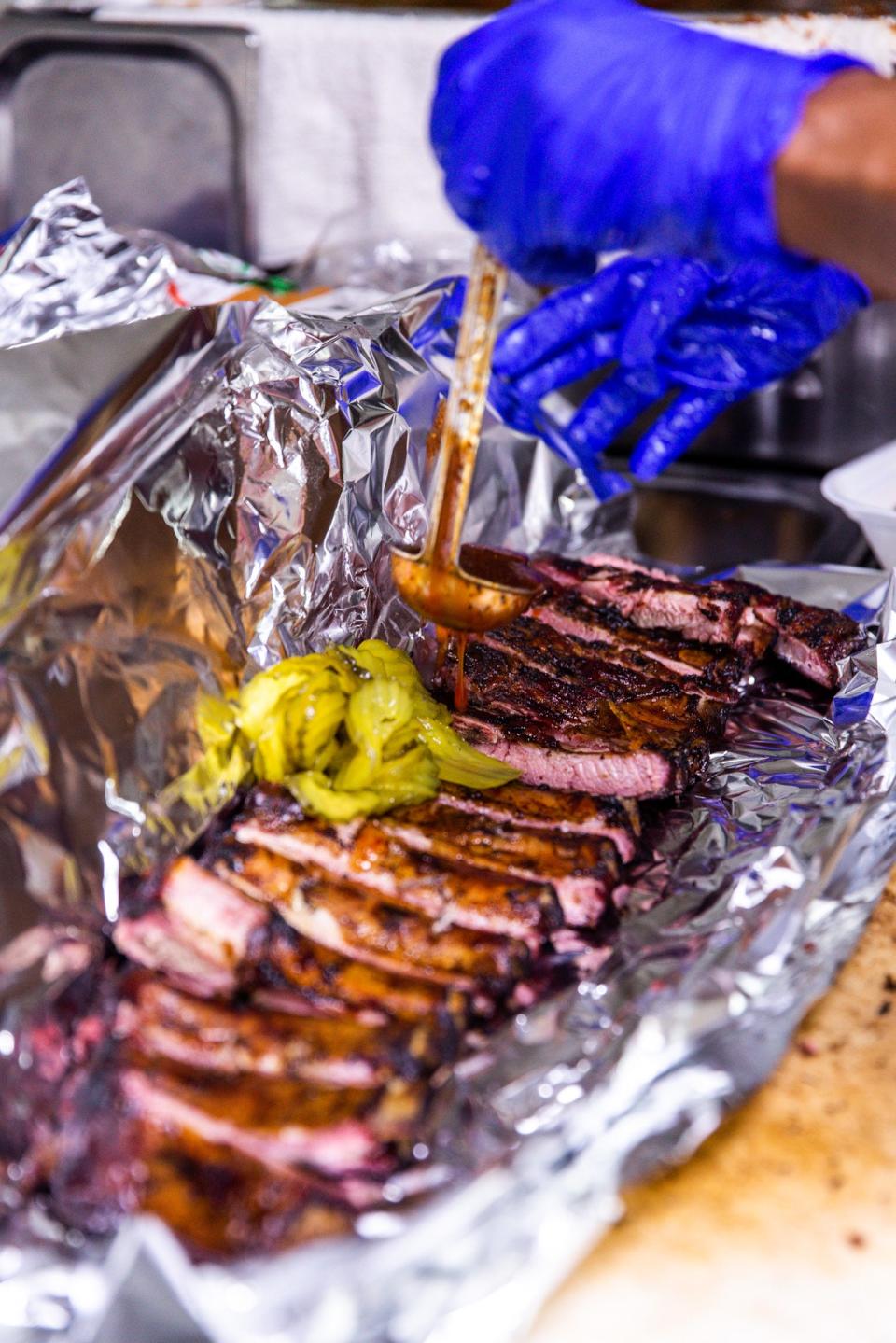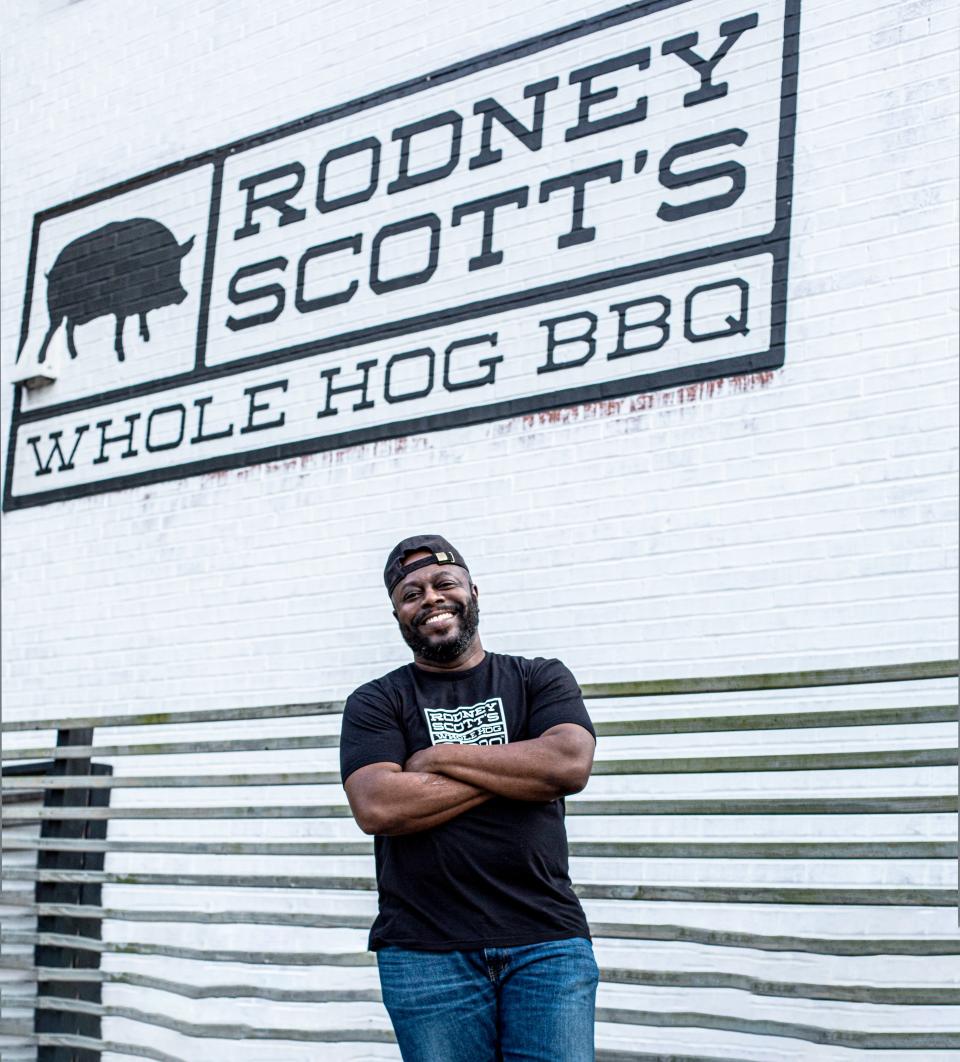The Overlooked Contributions of Black Americans to U.S. Barbecue Culture
- Oops!Something went wrong.Please try again later.
All products featured in this story are independently selected by our editors. However, when you buy something through our retail links, we may earn an affiliate commission.
Ed Mitchell’s mother didn’t intend to sell her barbecue. In the mood for some old-fashioned whole-hog cooking one summer evening in 1991, she got to work in the parking lot of the family's grocery store outside of Raleigh, North Carolina. It was meant to be a casual, private meal, but after she placed some leftovers on the store counter to wrap up later, a customer wandered in and asked if it they was for sale. Word got quickly out, and the shop soon evolved into a full-blown barbecue restaurant, with lines down the street every weekend.
Today, her son, Ed, is an internationally recognized pitmaster who has cooked at the James Beard House in New York City. His six “Pitmaster” barbecue sauces, made with his son Ryan, are sold in 5,000 grocery stores throughout the country.

Ed and Ryan Mitchell
The Mitchell family is just one set of talented barbecue chefs that James Beard award-winning author Adrian Miller celebrates in his new book, Black Smoke: African Americans and the United States of Barbecue, which published in April. Miller ate pork ribs, hot links, and even something called barbecue spaghetti at more than 100 Black-owned barbecue joints across the country, all in the name of research. But though Black Smoke is full of recipes, it is first and foremost a chronicle. It explores barbecue through historical context and celebrates the many Black pitmasters who helped invent the dishes we know and love today—individuals who have been omitted from the public narrative for years.
“[I want] people to understand the significant contributions that African Americans have made to barbecue,” Miller says. “Unfortunately, in today’s food storytelling, African Americans are pushed to the sidelines or completely absent. This book is really a thump on the head to say you can’t talk about barbecue in the United States without including African Americans. That’s an incomplete story.”
Black Smoke: African Americans and the United States of Barbecue (Hardcover)
$30.00, Adrian E. Miller
According to Miller’s research, barbecue originated in the U.S. with Native Americans between the 1500s and 1700s. Enslaved Black people, who were, as Miller puts it, “the principal cooks” in most households from that time on, pulled from their techniques and mixed them with African and European styles of cooking to develop the more modern iteration of barbecue. (“Old” Arthur Watts, who was born enslaved in Randolph County, Missouri in 1837, made such a delicious sauce that it’s still bottled and sold by his descendants today.)
The cooking methods, seasonings, and cuts of meat have evolved over the years, but Black barbecuers were considered the experts for centuries. Miller writes that “a general consensus emerged in the late nineteenth century that African American barbecuers made the best and most authentic barbecue.” Segregation limited where Black entrepreneurs could cook and sell their food, though, and starting in the 1990s, white barbecuers became the central focus of food coverage.

Mary and Deborah Jones, Jones BBQ

Mary and Deborah Jones, Jones BBQ
Barbecue has seen a resurgence in popularity in recent years. There are TV shows—The American Barbecue Showdown and Chef’s Table BBQ on Netflix, BBQuest on Hulu, among them—and festivals and competitions across the country. Texas Monthly even named its first barbecue editor in 2013. But the distinct element of our contemporary obsession is that it includes, in greater numbers than ever before, the faces and voices of Black pitmasters. In 2018, Rodney Scott—who cooks whole hogs over coals at his duo of Rodney Scott’s Whole Hog BBQ locations—won Best Chef: Southeast at the James Beard Awards. This past October, Desiree Robinson, pitmaster at Cozy Corner in Memphis, became the first Black woman to be inducted into the Barbecue Hall of Fame. Mary and Deborah Jones have been selling out of their secret (and addicting) barbecue sauce since appearing on season three of Queer Eye. And the recently released Netflix show High on the Hog, while not focused on barbecue specifically, is entirely focused on highlighting the contributions of African American to U.S. food traditions.
“Everybody wants their story told,” said Kevin Bludso, a judge on The American Barbecue Showdown. “When you say American cuisine or American barbecue or American soul food, we are such a part of all of that—African Americans are a part of all that.”
This is the type of representation and recognition Miller says has been missing from barbecue for years—but is ready for, and deserving of, the spotlight now. The food cannot be separated from its history, something that continues to be evident in every bite.
Take chef Rodney Scott, one of the pitmasters mentioned in Black Smoke, who grew up in South Carolina eating barbecue sandwiches every Thursday. It takes about 12 hours to cook a 160- to 180-pound hog in the traditional way he was taught; he calls the process “a labor of love.” A third location of his barbecue restaurant which uses this technique, Rodney Scott's Whole Hog BBQ, is slated to open in Atlanta this summer. (Scott also published Rodney Scott’s World Of BBQ: Every Day is a Good Day in March, which Miller says is the first cookbook by a Black pitmaster in at least three decades.)

Rodney Scott, Whole Hog BBQ
Bludso, of the The American Barbecue Showdown, sells Texas-style ribs, brisket, chicken, and more out of three Bludso’s Bar & Que locations in Los Angeles, as well as a single eatery in Melbourne, Australia. He recently signed on as a mentor with the new Preserve the Pit fellowship, which provides training and capital to Black barbecue entrepreneurs. He'll also be publishing The Bludso Family Cookbook next spring. “You have to keep the light lit,” says Bludso. “Us, as African American pitmasters, we have to keep telling the story.”
For his part, Ryan Mitchell is continuing the family traditions that began with his great-grandparents with a new restaurant, the Preserve, in North Carolina, where he and his dad will cook old-fashioned whole hog barbecue; it’s expected to open in early 2022. The pair are also working to expand their retail presence with rubs and spices. “It’s important that as African Americans, we need to be putting our arms around the culinary contributions and the cuisines that we mastered and we gave to this country,” Ryan says. “Barbecue is a great start.”
Originally Appeared on Condé Nast Traveler


